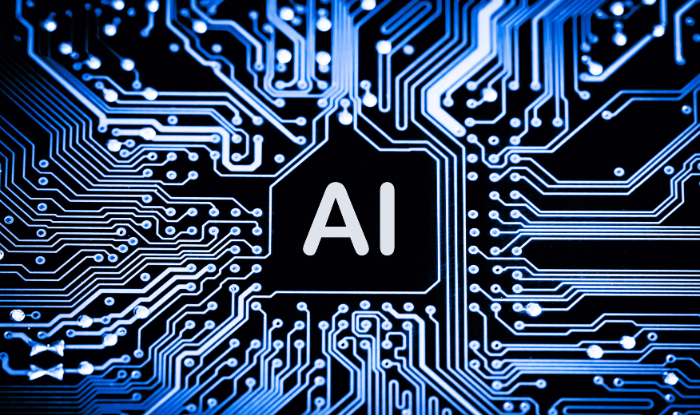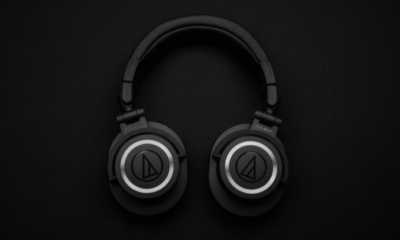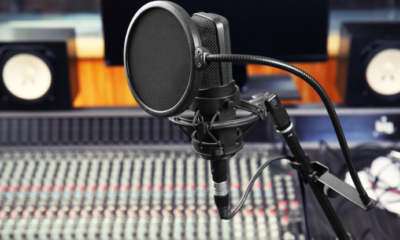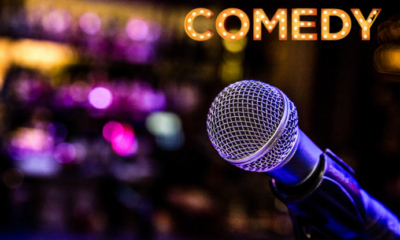EDITORIAL
Plugged In: How AI is changing the world of podcasting
Artificial intelligence used to be the stuff of science fiction – now it’s shaping the podcasts in your queue. From voice cloning to automated editing, AI is revolutionising the way podcasts are made, discovered, and consumed. And while some creators are embracing the tech with open arms, others are asking big questions about creativity, authenticity, and the future of the medium.
Welcome to the age of AI-powered podcasting!
Production, but Smarter
For many podcasters, the most time-consuming part of making a show isn’t recording – it’s everything else. Editing, transcribing, mixing, cleaning up audio… it can be a full-time job. That’s where AI is already making a huge impact.
Tools like Descript, Adobe Podcast, and Alitu are allowing creators to edit audio as easily as a Word doc – cutting “ums” and pauses with a single click or generating high-quality transcriptions in seconds. Noise removal, EQ balancing, and even full episode mastering can now be automated, dramatically speeding up workflows for indie podcasters and production houses alike.
Suddenly, what once required a studio and a sound engineer can now be done on a laptop in a café.
The Voice Revolution
One of the most talked-about developments in AI is voice synthesis. In other words: cloning voices and generating speech from text. This has huge potential for podcasting – good and bad.
Some creators are experimenting with “AI co-hosts” or synthetic narrators that can read scripts, translate episodes into other languages, or deliver content 24/7. It also opens the door to accessibility: for example, translating a podcast into multiple languages using the same voice tone and cadence.
But it raises serious ethical concerns. What happens when someone’s voice is cloned without consent? Or when fake interviews start blurring the line between fiction and reality? AI voices may be useful, but the human voice – warts and all – still carries something algorithms can’t replicate: trust.
Discoverability & Personalisation
If there’s one problem all podcasters face, it’s getting heard. With over 5 million podcasts globally, standing out is harder than ever. AI-driven discovery engines are starting to tackle this, using natural language processing to analyse transcripts and recommend episodes based on actual content – not just titles or tags.
Spotify, Apple, and Amazon are all investing in smarter search and personalised recommendations. Meanwhile, AI-powered tools are helping creators write episode descriptions, generate SEO-friendly titles, and even craft social media copy. In a world where discoverability is half the battle, AI may be the secret weapon smaller shows need to grow.
Creative Collaboration or Creative Crisis?
AI is also creeping into content creation itself. Some podcasters use AI to brainstorm episode ideas, generate interview questions, or create fictional narratives and scripts. AI-generated soundtracks and ambient audio are also becoming more common – especially for narrative podcasts and audio fiction.
But this creative boost comes with tension. At what point does AI stop being a tool and start becoming the creator? And how do we credit work created by – or with – the help of algorithms?
In response, some creators are choosing to be transparent about their use of AI, treating it like a collaborator rather than a silent assistant. Others worry that as AI becomes more capable, the industry may devalue original voices in favour of cheap, fast, synthetic content.
The Human Element Still Matters
Despite the hype, one thing is clear: AI can enhance podcasting, but it can’t replace the human connection that makes the medium so powerful. Listeners don’t just tune in for facts or sounds – they tune in for personality, vulnerability, perspective. AI can’t replicate lived experience, emotional nuance, or that moment when a host bursts out laughing mid-story.
In a way, the rise of AI might remind us what we value most about podcasting: its humanity.
What’s Next?
As AI continues to evolve, expect more innovation – AI-curated playlists, real-time transcription and translation, smarter ad targeting, maybe even virtual podcast guests trained on historical figures or celebrities. But also expect more debate: about rights, ethics, originality, and what it means to be a creator in a world where machines can “create.”
One thing’s for sure: AI is not the future of podcasting – it’s already part of its present. The real question now is how we choose to use it.













